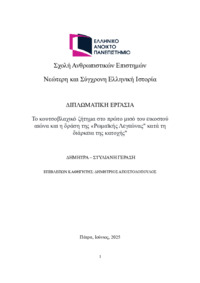- MSc thesis
- Νεώτερη και Σύγχρονη Ελληνική Ιστορία (ΣΕΙ)
- 20 July 2025
- Ελληνικά
- 60
- Δημήτριος Αποστολόπουλος
- Ελευθερία Μαντά | Ηλίας Σκουλίδας
- Βλάχοι, Κουτσοβλαχικό ζήτημα, Εθνική ταυτότητα, Ρουμανική προπαγάνδα, Ρωμαϊκή Λεγεώνα, Αλκιβιάδης Διαμάντης
- Νεώτερη και Σύγχρονη Ελληνική Ιστορία
- 41
- 9
-
-
Η παρούσα εργασία εξετάζει την πολιτική διάσταση του Κουτσοβλαχικού ζητήματος, ενός ιστορικού φαινομένου που σχετίζεται με τη διεκδίκηση της ταυτότητας των Βλάχων από τον ελληνικό και τον ρουμανικό εθνικισμό κατά τον 19ο και 20ό αιώνα. Οι Βλάχοι, μια λατινόφωνη πληθυσμιακή ομάδα των Βαλκανίων με έντονη κινητικότητα και πολιτισμική ιδιαιτερότητα, αποτέλεσαν αντικείμενο ανταγωνιστικών εθνικών αφηγήσεων, κυρίως λόγω της συγγένειας της γλώσσας τους με τα ρουμανικά αλλά και της γεωγραφικής τους διασποράς.
Η εργασία αναλύει πώς η Ρουμανία προσπάθησε να ενισχύσει τη δική της επιρροή στις βλαχόφωνες κοινότητες μέσω εκπαιδευτικών, εκκλησιαστικών και προπαγανδιστικών μηχανισμών, καθώς και πώς αντέδρασε η ελληνική πλευρά. Ιδιαίτερη έμφαση δίνεται στις περιόδους του Α’ Παγκοσμίου Πολέμου και της Ιταλογερμανικής Κατοχής, όπου παρατηρούνται και ενέργειες αυτονόμησης από φιλορουμανικά και φιλοϊταλικά στοιχεία εντός των βλαχικών κοινοτήτων, με αποκορύφωμα τη δράση του Αλκιβιάδη Διαμάντη και την ίδρυση της «Ρωμαϊκής Λεγεώνας».
Η μελέτη βασίζεται σε πρωτογενές αρχειακό υλικό (Γενικά Αρχεία του Κράτους, πρακτικά δικών δοσιλόγων, εφημερίδες της εποχής) και δευτερογενείς επιστημονικές πηγές, φωτίζοντας τις εσωτερικές διαφοροποιήσεις της βλάχικης κοινότητας και τις διαφορετικές στάσεις που υιοθέτησαν οι Βλάχοι απέναντι στις εθνικές αφηγήσεις και τις εξωτερικές παρεμβάσεις.
Συμπερασματικά, το Κουτσοβλαχικό ζήτημα δεν ήταν απλώς ένα ελληνορουμανικό διπλωματικό πρόβλημα, αλλά ένα πολύπλοκο πολιτισμικό και πολιτικό ζήτημα, στενά συνυφασμένο με τη διαμόρφωση της εθνικής ταυτότητας και τον ρόλο των μειονοτήτων στα Βαλκάνια.
-
This thesis investigates the political dimension of the Koutsovlach Question, a significant but understudied issue in Balkan history, focusing on the contestation of the Aromanian (Vlachs) identity between Greek and Romanian nationalisms from the mid-19th century until the end of World War II. The Vlachs, a Latin-speaking ethnic group historically engaged in transhumant pastoralism and trade, found themselves at the intersection of competing nation-building projects, particularly those of Greece and Romania. The study analyzes how both states, along with other regional and international actors (including Italy and the Great Powers), utilized education, religious affiliations, propaganda networks, and diplomatic pressure to attract or manipulate the allegiance of the Vlach populations. Special attention is given to the role of the Romanian state in establishing a network of schools and churches across the southern Balkans, promoting a Romanian identity among the Vlachs, as well as Greece’s efforts to assert national integration through cultural and religious institutions.
The thesis also explores the controversial actions of Vlach figures such as Alcibiades Diamantis during the Axis occupation, highlighting the foundation and activities of the so-called «Romanian Legion" in alliance with the Italian fascist authorities. Drawing from a wide range of archival sources, including state documents, newspapers, trial records of collaborators, and scholarly monographs, the research emphasizes the internal divisions within the Vlach communities and their varying responses to external pressures.
Ultimately, this work argues that the Koutsovlach Question was not merely a diplomatic or educational dispute, but a complex, politically charged issue deeply tied to questions of identity, loyalty, and sovereignty. It offers a nuanced perspective on how minority groups were positioned within the broader geopolitical dynamics of the Balkans and how national identity was constructed, negotiated, and resisted in a shifting historical landscape.
-
- Hellenic Open University
- Αναφορά Δημιουργού-Μη Εμπορική Χρήση 4.0 Διεθνές


